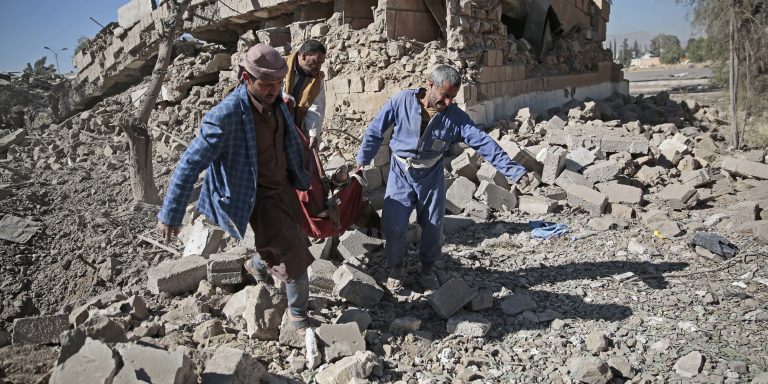INTELBRIEF
August 30, 2018
IntelBrief: Who Will Answer For Yemen?

- A report sponsored by the United Nations Human Rights Council says that all parties in the ongoing Yemen conflict have committed war crimes.
- While saying ‘none have clean hands,’ the report stated the Saudi-led coalition airstrikes have killed the most people, and routinely ignored even its own no-strike lists.
- The head of the report stated, ‘there is little evidence of any attempt by parties to the conflict to minimize civilian casualties.’
- The U.S. is reassessing its substantial support for the war but continues that support despite shocking civilian deaths.
.
Since the conflict began in 2015, the atrocities committed in the course of the Yemen war have been well known to the international community. Now, three years later, there might finally be enough pressure to bring about an end to the deadly conflict. The recent killing of at least 40 children on a school bus targeted by a Saudi airstrike generated more than the usual muted criticism of U.S. support for the Saudi-led coalition. The school bus strike is on top of repeated strikes on hospitals, schools, weddings, and funerals. A new report sponsored by the United Nations Human Rights Council is adding to the pressure, but it remains to be seen if the U.S. will go beyond ‘constant reviewing’ to actually stop providing direct support to coalition partners.
The U.N.’s release about the new report, which was carried out by the Group of Regional and International Eminent Experts on Yemen, had a direct opening: ‘Information documented by the Group of Regional and International Eminent Experts on Yemen strongly suggests that parties to the armed conflict have perpetrated, and continue to perpetrate, violations and crimes under international law.’ The ‘Group of Experts’ is a body of experts on Yemen created by the United Nations High Commissioner for Human Rights under the authority of U.N. Resolution 36/31. The report covers September 2014 to June 2018. Saudi Arabia and the United Arab Emirates began their military campaign against the Houthi rebels in March 2015; the U.S. has directly and extensively supported it since that time.
The U.N. release about the report, which will be submitted next month, says that all parties have likely committed, and continue to commit, violations of international law. It further states ‘individuals in the Government of Yemen and the coalition, including Saudi Arabia and the United Arab Emirates, and in the de facto authorities have committed acts that may, subject to determination by an independent and competent court, amount to international crimes.’
Yet while all parties are guilty, the report states that the Saudi-led coalition is the worst violator, given that it is conducting inaccurate or indiscriminate airstrikes against an opponent with no credible air defenses. The release bluntly states that the report finds ‘coalition air strikes have caused most direct civilian casualties.’ This assessment is widely known but generally hedged as ‘all sides’ given Saudi pressure on any country or organization that criticizes its performance and aims in the war.
That criticism has resulted in some symbolic but ineffective Congressional efforts to force the Trump administration to be more transparent about the scope of U.S. involvement in Yemen, and the possibility that its forces might be legally exposed to the ongoing war crimes. As with the Obama administration, the Trump administration has decided that supporting Saudi Arabia in its misguided and poorly-executed military campaign in Yemen was a geopolitical gain worth whatever the Yemenis would pay. The campaign has been sold as a vital front against Iranian expansion, even though the war itself has actually increased Iranian inference with the Houthi rebels, and degraded the counterterrorism effort against al-Qaeda in the Arabian Peninsula. On August 28, U.S. Secretary of Defense Mattis stated that U.S. military support to Saudi Arabia in Yemen is ‘not unconditional,’ which counts as pointed criticism in such circles.
.
For tailored research and analysis, please contact: info@thesoufancenter.org
[video width="960" height="540" mp4="https://thesoufancenter.org/wp-content/uploads/2018/08/IB-0830.mp4" poster="https://thesoufancenter.org/wp-content/uploads/2018/08/AP_17347388702401.jpg"][/video]